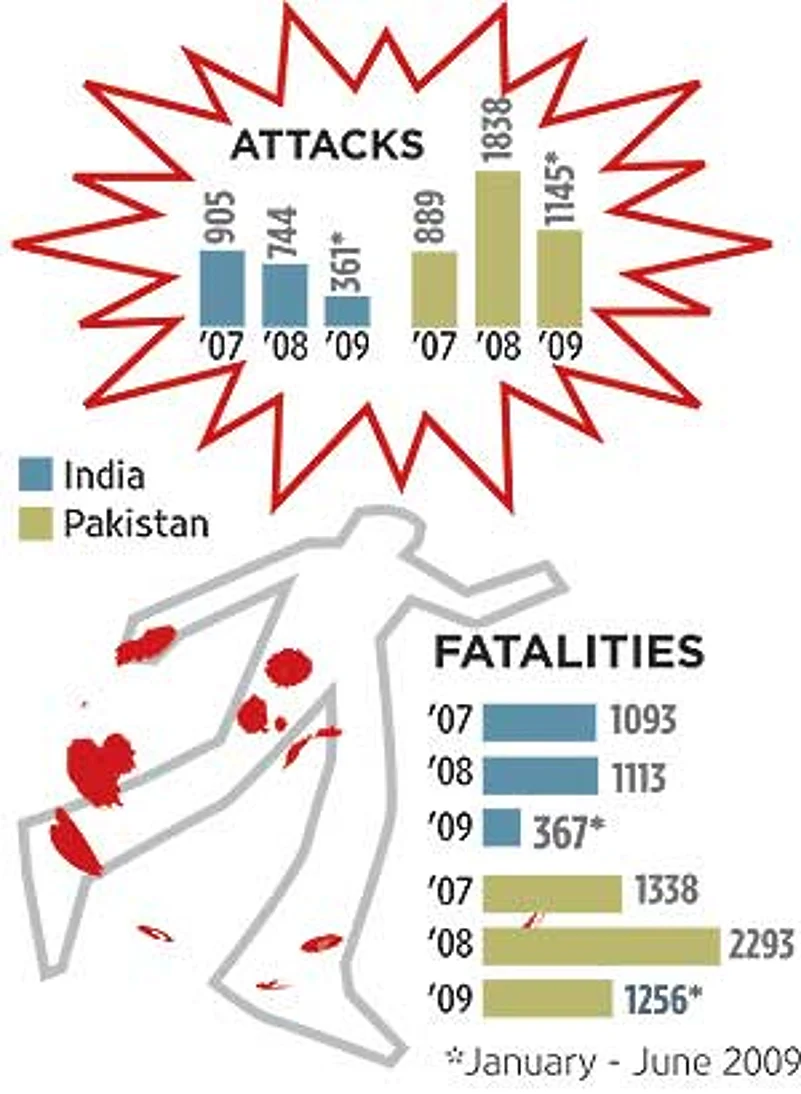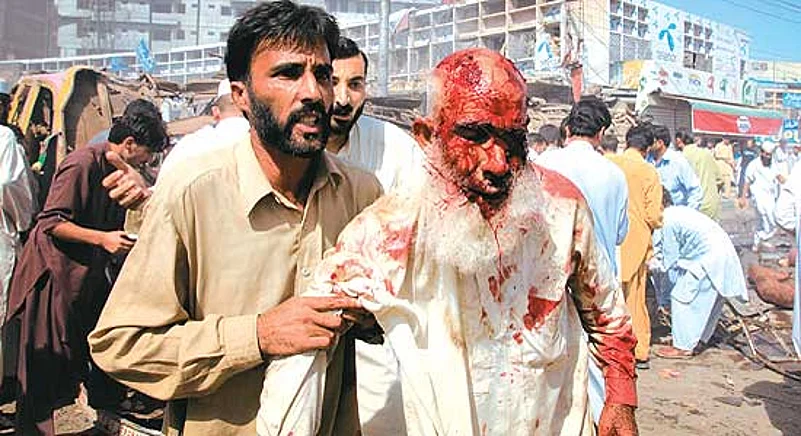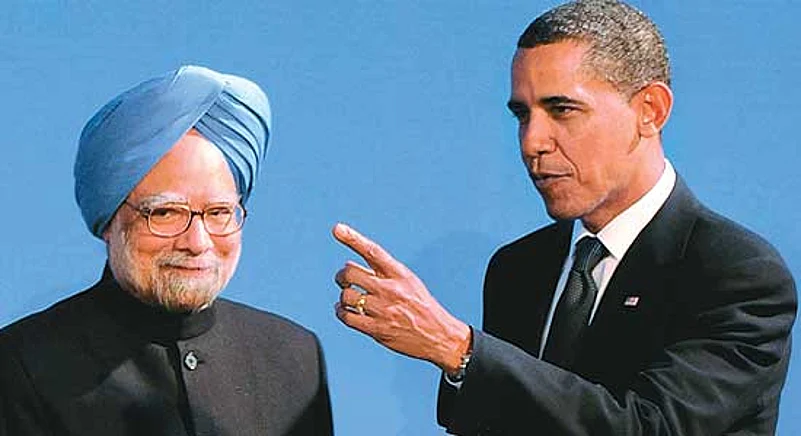As India mourns its victims on the first anniversary of 26/11, Prime Minister Manmohan Singh will be winging his way to Washington for his first summit meeting, on November 24, with US President Barack Obama. The dark, haunting images of Mumbai will surely set a context—images that have somehow survived those interminable series of blasts recently in Pakistan, the battlefield of global jehad. The seeming convergence of interests already has people asking: can Delhi bank on Washington to control Pakistan? The question assumes import because of the space America seems to have given China in South Asia.
Terror Toll Booth

It’s ironical the question is even asked for, traditionally, third-party intervention in bilateral issues is anathema to India. In recent years, though, New Delhi has come to increasingly rely on the US to resolve its problems with Pakistan. Take 26/11, for instance. US pressure compelled Pakistan to take the unprecedented step of admitting to the role of its citizens in the attacks, even arresting seven Lashkar leaders. These early promises of a concerted crackdown soon stalled, and Islamabad and New Delhi slipped into the familiar mode of mutual recriminations over the dossiers they had been exchanging. Officials believe Pakistan will only take “cosmetic steps” to curb terrorism directed against India, leaving it as vulnerable as before.
Manmohan’s visit to Washington has consequently fanned hopes of Obama interceding on India’s behalf. US ambassador in Delhi, Timothy Roemer, says, “There will be a lot of discussion between the two leaders on Pakistan and terrorism.” Roemer said his government is committed to working with India “shoulder to shoulder, hand to hand and hour by hour” in its fight against terrorism. He also repeated the familiar Indian demand—Pakistan must arrest Lashkar founder Hafiz Saeed, bring those guilty of 26/11 to justice and dismantle the terror apparatus on its soil. “There will be a rich, healthy and robust discussion between the two leaders on the AfPak policy. The cooperation between the two sides on counter-terrorism has been unprecedented,” he added. Much of this cooperation involves America’s FBI exchanging intelligence, gathered through sophisticated technology, with India.
But even as Manmohan and Obama plan to further their cooperation on counter-terrorism, Pakistan doesn’t quite seem to be playing ball. “It’s clear that the Americans and Pakistanis are not singing from the same page on this,” a senior Indian foreign official told Outlook. He says there’s no doubt that India’s and America’s interests converge—both want to see Pakistan free of terrorism. But both countries differ in their perception about Pakistan’s seriousness in rooting out terrorism from its soil.

It’s all in the mix: The scene after a suicide bomb attack in Peshawar, Oct 9, ’09
India believes Pakistan, particularly its security establishment, continues to distinguish between the various terrorist groups that operate from its soil. Islamabad has been taking action against the Tehreek-e-Taliban Pakistan (TTP), which has challenged the Pakistan army and American interests, but isn’t willing to defang anti-India groups such as the Lashkar and Jaish-e-Mohammed.
India’s argument, however, has found little resonance in the US establishment till now. US officials feel the Pakistan army’s operation in South Waziristan has a serious intent, worthy of commendation. The Obama administration, in fact, sees Pakistan as a victim of terrorism, citing the dramatic increase in terror attacks over the last three years in Pakistan as compared to India (see graphic). More importantly, Obama can’t pressure Islamabad to the point where it covertly begins to oppose his quest to stabilise Afghanistan—a goal he is keen to achieve at the earliest, so as to pull out American troops from there.
This divergence of interest has a few cautioning India against relying on the US to quieten Pakistan. “India should not outsource its Pakistan problem to the US,” political commentator and writer Sunil Khilnani told Outlook. “We need to recognise that our and America’s interests on Pakistan don’t always square up.” He says should India continue to pursue this course, then New Delhi will also have to increasingly defer to Washington’s wishes. Really, there are no free lunches in international relations.
Former Indian foreign secretary Lalit Mansingh agrees, “I remain sceptical that the US will do what we require it to do on Pakistan.” He says Pakistan has admitted to the role of its citizens in Mumbai only because it’s simply “undeniable”. Where is there any real, substantive action against Hafiz Saeed’s network or dismantling of the terror apparatus, he asks. “I don’t think the US is putting enough pressure on Pakistan,” Mansingh says.
Yet, beyond India’s eagerness to tame Pakistan, there’s also the possibility of Pakistan collapsing. A failed Pakistani state is neither in India nor in America’s interest. An analysis of the situation there is expected to dominate the Manmohan-Obama parleys next week. Many in the US feel India must factor this into its policy, and accommodate Pakistan to nudge it on to the right track. For instance, Michael Krepon of the Henry L. Stimson Center says, “The bloodletting in Pakistan shows no sign of waning. More mass casualty attacks in Pakistan can be expected, as well as on Indian soil.... Under these circumstances, further delays in the resumption of the Indo-Pak dialogue because Islamabad must ‘do more’ against extremist groups or bring Hafiz Saeed to trial seem questionable, at best.”
In contrast, a resumption of dialogue could address the popular angst in Pakistan that its leaders are acquiescing to India, as also check the region from slipping into instability should there be another attack in India. What could immensely encourage Pakistan about India’s intent is an initiative on Kashmir. In anticipation of Obama raising the K-word at the meeting, the Centre has thought it prudent to reach out to the Kashmiri leadership over the last fortnight.
In the unstable triangle of India, Pakistan and the US, another factor has to be entered: China. On his recent trip to Beijing, Obama issued a joint statement with his Chinese counterpart Hu Jintao stating it was in their interest to see improvement in Indo-Pak relations. Many in India perceived it as an attempt to grant China a supervisory role in South Asia.
In the Indian foreign establishment, though, the opinion is divided. One school of thought believes it serves China’s strategic interest to see India bogged down with its problem of terrorism emanating from Pakistan. But another school feels Beijing realises that the region’s stability is vital to its own growth, particularly as China too has been rocked by Islamic terrorism. Mansingh, while cautioning against third-party adventurism, says, “I think we are making too much of a fuss over the Sino-US joint statement”.
So, has Amercia’s help post-26/11 made any lasting difference? “There’s no guarantee that in the coming days there will be no such attack on India,” a senior home ministry official admits, despite the substantial improvement in the Indian intelligence and security network. What will India’s response be should there be another Mumbai? “If that happens, then all bets are off,” a senior foreign ministry official said, hinting at the possibility of the Indian leadership taking military action against Pakistan.
But military action against Pakistan, argues Khilnani, isn’t likely to work because it can’t be considered a typical sovereign state with only one power centre; there are multiple power centres ranging from the civilian to the military to the intelligence agency—all pulling in different ways. Khilnani, therefore, argues that New Delhi will have to develop a wide array of subtle policies to deal more effectively with these multiple centres of power. “Pakistan may cease to be an issue for the US. But it will stay with us for a very long time,” Khilnani adds.
It is typical for voices of sanity such as Khilnani’s to get lost in the buzz over events like Manmohan’s visit to the US. The media is expected to go to town on how he is the first leader to come to Washington on a state visit this year. So expect gushing epithets about the ceremonial reception to Manmohan, the state banquet at the White House and the state department lunch hosted by vice-president Joe Biden and secretary of state Hillary Clinton. But, really, there won’t be any big-ticket item, as the nuclear deal was under the Bush administration. Manmohan’s visit will mostly be about terrorism and Pakistan, on which one can’t hope for instant delivery. A best case scenario: Pakistan will be tempered, but just about.

























